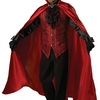Elizabeth has two identical number cubes. both cubes have faces numbered 1 through 6. If Elizabeth rolls each cube once, What is the probability that the sum of the two numbers on the top faces will be 10.
Answers (1)
Know the Answer?
Not Sure About the Answer?
Find an answer to your question 👍 “Elizabeth has two identical number cubes. both cubes have faces numbered 1 through 6. If Elizabeth rolls each cube once, What is the ...” in 📗 Mathematics if the answers seem to be not correct or there’s no answer. Try a smart search to find answers to similar questions.
Search for Other Answers
You Might be Interested in
If 39 is 1% of a number, what is that number? How did you find your answer?
Answers (1)
100 is divisible by which of the following numbers 2, 3, 4, 5, 6, 9, or 10? A.) 2, 3, 4, and 6 B.) 2, 4, 5, and 10 C.) 5 and 10 D.) 2, 4, 6, and 10
Answers (1)
How much water should be added to 23 packets of flavoring
Answers (1)
Let f (x) = 4x - 5; g (x) = 6x - 3 find 2f (x) + 3g (x) select the correct response: 1. 8x - 13 2. 10x + 1 3. 26x - 19 4. - 24x - 21
Answers (1)
Consider the line - 2x-4y=-2 What is the slope of a line parallel to this line What is the slope of a line perpendicular to this line
Answers (1)
New Questions in Mathematics
You drive 70 miles per hour but then slow your speed by 15 miles per hour. you then return to your speed of 70 miles per hour. which expression shows how your speed changed?
Answers (1)
Given r = 8 and ø=1.85pi, find the Cartesian coordinates. Check your answer. a. (7.13, - 3.63) C. (-7.08, 3.67) b. (7.08, - 3.67) d. (-7.80, - 3.67)
Answers (1)
Type the correct answer in the box. Use numerals instead of words. If necessary, use / for the fraction bar. The solution set of n2 - 14n = - 45 is [ ]
Answers (1)
Peter is 2 years older than Winnie. Peter's age is 16 years less than seven times Winnie's age. The equations below model the relationship between Peter's age (p) and Winnie's age (w): p = w + 2 p =
Answers (1)
Name a fraction equivalent to 2/3
Answers (2)

